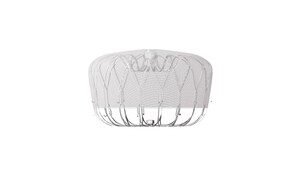First Patient Enrolled in Boston Scientific Randomized Study of Removable WallFlex® Biliary RX Fully Covered Stent for Patients Suffering From Chronic Pancreatitis
Study to Compare Clinical Outcomes of Self-Expanding Metal Stents (SEMS) Versus Plastic Stents for the Treatment of Biliary Strictures Caused by Chronic Pancreatitis
NATICK, Mass., Dec. 4, 2012 /PRNewswire/ -- The first patient has been enrolled in a Boston Scientific Corporation (NYSE: BSX) study comparing the WallFlex® Biliary RX Fully Covered self-expanding metal stent (SEMS) to plastic stents for the treatment of benign bile duct strictures caused by chronic pancreatitis. This multi-center, prospective, randomized study will enroll 164 patients at leading hospitals in Australia, Austria, Belgium, Canada, France, Germany, Hong Kong, India, Italy and the Netherlands.
In a separate single-arm study, 187 patients were treated with the WallFlex Stent for multiple types of benign biliary strictures including, those caused by chronic pancreatitis. The stents implanted in that study were removed up to one year after being placed in the body. Five-year follow-up post stent removal is ongoing. Preliminary data were presented this summer at Digestive Disease Week 2012 by Professor Jacques Deviere of Erasme Hospital in Brussels. The data indicate that a SEMS can be removed safely any time up to one year post placement, and that short-term stricture resolution rates compare favorably with the results reported with plastic stents in chronic pancreatitis-related benign biliary strictures.
"Preliminary data show promising results for the treatment of chronic pancreatitis-related benign biliary strictures using SEMS, compared to literature on the use of plastic stenting," said Professor Puspok of the Medical University of Vienna, an investigator in both studies who enrolled the first patient in the randomized study. "Multiple plastic stenting remains an established treatment choice for biliary strictures caused by chronic pancreatitis. However, this form of treatment requires multiple stent exchanges and the long-term success rate is low. Treatment with removable fully covered SEMS could overcome these limitations. A head-to-head comparison of both stenting treatment regimens is essential in order to collect robust data to guide physicians in the optimal treatment of their patients with chronic pancreatitis."
SEMS, which have a significantly larger diameter than plastic biliary stents, have long been the standard of care for palliation of malignant biliary strictures. The studies above are evaluating the benefits of using a SEMS in benign biliary strictures, with an objective to demonstrate stricture resolution in fewer procedures.
"Boston Scientific continues to deliver industry-leading technologies that enhance patient quality of life," said David Pierce president of the Endoscopy business at Boston Scientific. "We are hopeful that the results of this study will demonstrate clinical benefit and cost effectiveness of a single metal stent approach versus plastic stenting, which typically requires multiple procedures."
The WallFlex Biliary RX Fully Covered Stent has a silicone polymer Permalume® Coating designed to reduce the potential for tumor/tissue ingrowth, and an integrated retrieval loop for removing or repositioning the stent in the event of incorrect placement during the initial procedure or for removal from benign strictures up to one year after placement. The stent is constructed of braided, platinum-cored Nitinol wire (Platinol™ Wire) and features three key components: radial force to help maintain duct patency and resist migration, flexibility to aid in conforming to tortuous anatomies and full-length radiopacity to enhance stent visibility under fluoroscopy.
The complete line of WallFlex Stents − Fully Covered, Partially Covered and Uncovered − is available in the United States and has CE Mark approval for use in the palliative treatment of malignant biliary strictures. In addition, the WallFlex Biliary RX Fully Covered stent is CE marked for the treatment of benign biliary strictures. The WallFlex Stent is the most frequently implanted biliary metal stent worldwide.
The WallFlex Stent is not approved in the United States for use in the treatment of benign biliary strictures. The safety and effectiveness of the stent for use in the vascular system have not been established.
For more information, visit Boston Scientific Endoscopy Resources on-line at www.bostonscientific.com/endo-resources.
About Boston Scientific
Boston Scientific is a worldwide developer, manufacturer and marketer of medical devices that are used in a broad range of interventional medical specialties. For more information, please visit: www.bostonscientific.com.
Cautionary Statement Regarding Forward-Looking Statements
This press release contains forward-looking statements within the meaning of Section 27A of the Securities Act of 1933 and Section 21E of the Securities Exchange Act of 1934. Forward-looking statements may be identified by words like "anticipate," "expect," "project," "believe," "plan," "estimate," "intend" and similar words. These forward-looking statements are based on our beliefs, assumptions and estimates using information available to us at the time and are not intended to be guarantees of future events or performance. These forward-looking statements include, among other things, statements regarding clinical trials and the importance of their findings, clinical outcomes, product performance and competitive offerings. If our underlying assumptions turn out to be incorrect, or if certain risks or uncertainties materialize, actual results could vary materially from the expectations and projections expressed or implied by our forward-looking statements. These factors, in some cases, have affected and in the future (together with other factors) could affect our ability to implement our business strategy and may cause actual results to differ materially from those contemplated by the statements expressed in this press release. As a result, readers are cautioned not to place undue reliance on any of our forward-looking statements.
Factors that may cause such differences include, among other things: future economic, competitive, reimbursement and regulatory conditions; new product introductions; demographic trends; intellectual property; litigation; financial market conditions; and future business decisions made by us and our competitors. All of these factors are difficult or impossible to predict accurately and many of them are beyond our control. For a further list and description of these and other important risks and uncertainties that may affect our future operations, see Part I, Item 1A – Risk Factors in our most recent Annual Report on Form 10-K filed with the Securities and Exchange Commission, which we may update in Part II, Item 1A – Risk Factors in Quarterly Reports on Form 10-Q we have filed or will file hereafter. We disclaim any intention or obligation to publicly update or revise any forward-looking statements to reflect any change in our expectations or in events, conditions or circumstances on which those expectations may be based, or that may affect the likelihood that actual results will differ from those contained in the forward-looking statements. This cautionary statement is applicable to all forward-looking statements contained in this document.
CONTACT:
Steven Campanini
508-652-5740 (office)
Media Relations
Boston Scientific Corporation
[email protected]
Michael Campbell
508-650-8023 (office)
Investor Relations
Boston Scientific Corporation
[email protected]
SOURCE Boston Scientific Corporation
WANT YOUR COMPANY'S NEWS FEATURED ON PRNEWSWIRE.COM?
Newsrooms &
Influencers
Digital Media
Outlets
Journalists
Opted In






Share this article